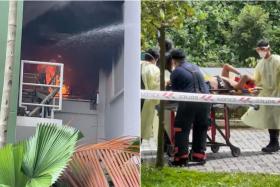SAF tightens measures to prevent heat injuries
Measures include expanding use of cooling pads, implementation of an arm immersion cooling system
The Singapore Armed Forces (SAF) has introduced steps to improve the way it manages heat injuries among national servicemen, following lapses and breaches in training and safety as well as casualty mismanagement that led to the death of a serviceman in April.
The measures include expanding the use of purpose-built cooling pads, implementing an arm immersion cooling system and simplifying evacuation procedures.
Giving a detailed account of the circumstances surrounding Corporal First Class (CFC) Dave Lee's death based on the preliminary assessment of the Committee of Inquiry (COI), Defence Minister Ng Eng Hen disclosed the steps taken as he stressed the need for safety.
"We need a strong SAF that can defend Singapore, but it must and can be built without compromising the safety and well-being of Singapore's precious sons serving National Service (NS)," said Dr Ng.
Full-time national serviceman Lee, 19, a Guardsman from the 1st Battalion Singapore Guards, died on April 30, two weeks after being admitted to Changi General Hospital for heat stroke.
He had completed an 8km fast march in Bedok Camp on April 18 before he showed signs of heat injury. During training the day before the fast march, CFC Lee had to run at a faster pace than what he was required to, said Dr Ng.
We need a strong SAF that can defend Singapore, but it must and can be built without compromising the safety and well-being of Singapore’s precious sons serving National Service.Defence Minister Ng Eng Hen
The commanders did this to enhance fitness and foster cohesion in the platoon, but this was a breach of training safety regulations, he added.
Later that night, CFC Lee's platoon was punished for about 30 minutes after some soldiers were repeatedly found to be using their mobile phones after lights out.
They eventually had about six hours and 15 minutes of sleep instead of the stipulated seven hours.
The commanders did not seek prior approval for this "informal punishment" or inform their superiors after it was done.
The next day, CFC Lee was the last to complete the 8km fast march. Shortly after, he was seen to be disoriented and was immediately attended to.
Those who attended to him thought he was suffering from physical exhaustion, and the COI found that there was inadequate on-site casualty management. His evacuation to the medical centre was also delayed.
The COI's preliminary assessment was that accumulated fatigue, insufficient rest, CFC Lee's less-than-optimal state of health and potential use of medication could have led to the heat stroke.
"However, the COI's preliminary assessment was that the likely reasons for CFC Lee succumbing to the heat stroke were inadequate on-site casualty management and delayed evacuation to the medical centre," said the minister.
Get The New Paper on your phone with the free TNP app. Download from the Apple App Store or Google Play Store now


